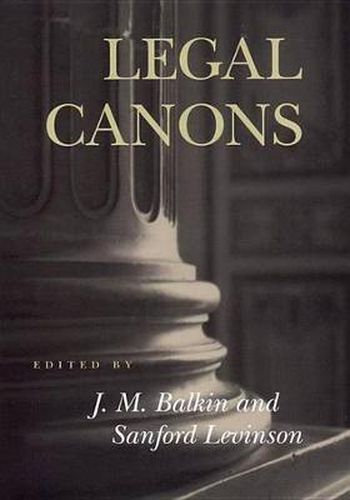Readings Newsletter
Become a Readings Member to make your shopping experience even easier.
Sign in or sign up for free!
You’re not far away from qualifying for FREE standard shipping within Australia
You’ve qualified for FREE standard shipping within Australia
The cart is loading…






Every discipline has its canon: the set of standard texts, approaches, examples, and stories by which it is recognized and which its members repeatedly invoke and employ. Although the last twenty-five years have seen the influence of interdisciplinary approaches to legal studies expand, there has been little recent consideration of what is and what ought to be canonical in the study of law today. Legal Canons brings together fifteen essays which seek to map out the legal canon and the way in which law is taught today. In order to understand how the twin ideas of canons and canonicity operate in law, each essay focuses on a particular aspect, from contracts and constitutional law to questions of race and gender. The ascendance of law and economics, feminism, critical race theory, and gay legal studies, as well as the increasing influence of both rational-actor methodology and postmodernism, are all scrutinized by the leading scholars in the field. A timely and comprehensive volume, Legal Canons articulates the need for, and means to, opening the debate on canonicity in legal studies.
$9.00 standard shipping within Australia
FREE standard shipping within Australia for orders over $100.00
Express & International shipping calculated at checkout
Every discipline has its canon: the set of standard texts, approaches, examples, and stories by which it is recognized and which its members repeatedly invoke and employ. Although the last twenty-five years have seen the influence of interdisciplinary approaches to legal studies expand, there has been little recent consideration of what is and what ought to be canonical in the study of law today. Legal Canons brings together fifteen essays which seek to map out the legal canon and the way in which law is taught today. In order to understand how the twin ideas of canons and canonicity operate in law, each essay focuses on a particular aspect, from contracts and constitutional law to questions of race and gender. The ascendance of law and economics, feminism, critical race theory, and gay legal studies, as well as the increasing influence of both rational-actor methodology and postmodernism, are all scrutinized by the leading scholars in the field. A timely and comprehensive volume, Legal Canons articulates the need for, and means to, opening the debate on canonicity in legal studies.